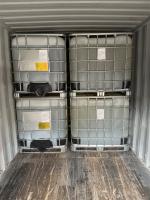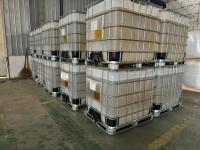Our Products
Product Center / Leading polyamine manufacturer(FL2250 FL2449 FL2550)|Polyamine suppliers in china

Leading polyamine manufacturer(FL2250 FL2449 FL2550)|Polyamine suppliers in china
polyamine FL2250 FL2449 FL2550)are three models with 50% solid and different viscosity ,mainly used for water treatment,sludge dewatering and other applications .
Polyamines are a class of organic compounds characterized by the presence of multiple amino groups. These versatile molecules find numerous applications across various industries due to their unique chemical properties and reactivity. Let's explore the main applications of polyamines in detail.
Water Treatment:
Polyamines are widely used in water treatment processes for their ability to remove contaminants and improve water quality. Their main applications include:
Coagulation and Flocculation: Polyamines are effective coagulants and flocculants, aiding in the removal of suspended solids, organic matter, and colloidal particles from water. By neutralizing the negative charges on particles and promoting their aggregation, polyamines facilitate their precipitation and subsequent removal through sedimentation or filtration processes.
Disinfection: Polyamines can enhance the efficacy of disinfection processes by assisting in the removal of organic precursors and microbial contaminants. They help in reducing the demand for disinfectants such as chlorine or ozone, thereby minimizing the formation of disinfection by-products and ensuring the safety of treated water.
Papermaking:
In the paper industry, polyamines are used as retention aids and drainage aids during the papermaking process. Their main applications include:
Retention Aid: Polyamines improve the retention of fine particles, fillers, and additives in the paper pulp, leading to enhanced paper quality and increased paper strength. They form complexes with negatively charged fibers and fillers, preventing their loss during the formation and dewatering stages of paper production.
Drainage Aid: Polyamines help in improving drainage on the paper machine by promoting the drainage of water from the paper sheet. This results in faster drying times, reduced energy consumption, and improved overall efficiency in paper manufacturing.
Textile Industry:
Polyamines find applications in the textile industry for fabric sizing, dyeing, and finishing processes. Their main applications include:
Fabric Sizing: Polyamines are used as sizing agents to improve the strength, smoothness, and handling properties of textile fibers. They form a protective film on the surface of fibers, enhancing their resistance to abrasion and reducing yarn breakage during weaving or knitting.
Dye Fixation: Polyamines help in fixing dyes to textile fibers by forming stable complexes with the dye molecules. This improves the color fastness, wash fastness, and overall color retention of dyed fabrics, leading to high-quality and durable textile products.
Softening and Antistatic Treatment: Polyamines impart softness and antistatic properties to textiles by reducing fiber-to-fiber friction and minimizing static electricity buildup. They enhance the tactile comfort and wearability of textile products, making them more appealing to consumers.
Adhesives and Coatings:
Polyamines are used in the formulation of adhesives, coatings, and sealants due to their excellent adhesion, bonding, and film-forming properties. Their main applications include:
Adhesive Formulation: Polyamines serve as crosslinking agents in the production of epoxy adhesives and coatings, enhancing their bonding strength, chemical resistance, and durability. They promote the formation of strong, flexible bonds between substrates, making them suitable for structural and industrial applications.
Coating Additive: Polyamines improve the adhesion, wetting, and leveling properties of coatings when used as additives. They enhance the surface coverage and film integrity of coatings, resulting in smooth, uniform, and protective finishes on various substrates.
Personal Care Products:
Polyamines are utilized in the formulation of personal care products such as shampoos, conditioners, and skin care products. Their main applications include:
Hair Conditioning: Polyamines act as conditioning agents for hair care products, providing moisture retention, detangling, and smoothing effects to the hair. They enhance the manageability, shine, and overall appearance of hair, making it softer, silkier, and more manageable.
Skin Conditioning: Polyamines help in improving the hydration, texture, and elasticity of the skin when incorporated into skin care formulations. They moisturize and nourish the skin, reducing dryness, roughness, and irritation, and promoting a healthy and youthful complexion.
Oilfield Chemicals:
Polyamines are used in the oil and gas industry as demulsifiers, corrosion inhibitors, and scale inhibitors in oilfield operations. Their main applications include:
Demulsification: Polyamines facilitate the separation of oil and water emulsions in crude oil production by destabilizing the emulsion droplets and promoting phase separation. They help in reducing the viscosity of crude oil, improving its flow properties, and enhancing the efficiency of oil-water separation processes.
Corrosion Inhibition: Polyamines protect metal surfaces from corrosion and degradation in oilfield equipment and pipelines by forming a protective barrier against corrosive agents. They inhibit the electrochemical reactions that lead to metal corrosion, extending the service life of assets and reducing maintenance costs.
Scale Inhibition: Polyamines prevent the formation of mineral scales, such as calcium carbonate and calcium sulfate, in oilfield production systems by sequestering metal ions and inhibiting their precipitation. They help in maintaining production efficiency, minimizing downtime, and prolonging the operational life of oilfield equipment.
Polyamines are a class of organic compounds characterized by the presence of multiple amino groups. These versatile molecules find numerous applications across various industries due to their unique chemical properties and reactivity. Let's explore the main applications of polyamines in detail.
-
Water Treatment: Polyamines are widely used in water treatment processes for their ability to remove contaminants and improve water quality. Their main applications include:
-
Coagulation and Flocculation: Polyamines are effective coagulants and flocculants, aiding in the removal of suspended solids, organic matter, and colloidal particles from water. By neutralizing the negative charges on particles and promoting their aggregation, polyamines facilitate their precipitation and subsequent removal through sedimentation or filtration processes.
-
Disinfection: Polyamines can enhance the efficacy of disinfection processes by assisting in the removal of organic precursors and microbial contaminants. They help in reducing the demand for disinfectants such as chlorine or ozone, thereby minimizing the formation of disinfection by-products and ensuring the safety of treated water.
-
-
Papermaking: In the paper industry, polyamines are used as retention aids and drainage aids during the papermaking process. Their main applications include:
-
Retention Aid: Polyamines improve the retention of fine particles, fillers, and additives in the paper pulp, leading to enhanced paper quality and increased paper strength. They form complexes with negatively charged fibers and fillers, preventing their loss during the formation and dewatering stages of paper production.
-
Drainage Aid: Polyamines help in improving drainage on the paper machine by promoting the drainage of water from the paper sheet. This results in faster drying times, reduced energy consumption, and improved overall efficiency in paper manufacturing.
-
-
Textile Industry: Polyamines find applications in the textile industry for fabric sizing, dyeing, and finishing processes. Their main applications include:




965_small.jpg)
168_small.jpg)